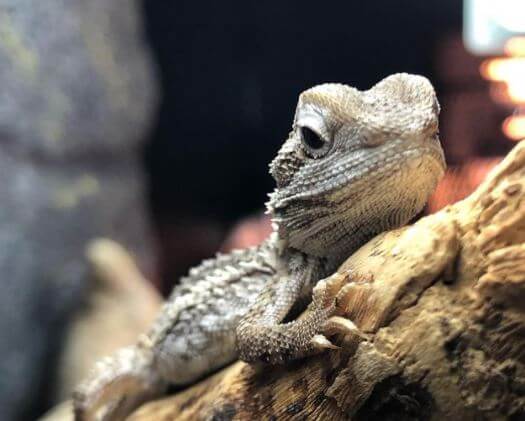How much UVB does a bearded dragon need?
Like other reptiles such as turtles or tortoises, UVB is very crucial for a bearded dragon. Do you know how much UVB a bearded dragon needs?
Many light bulbs give out radiation lights for our beardies. Through this article, you will know the suitable level that we should give to them.
Let’s get started!
Related Posts:
- Bearded Dragon VS Horned Toad: Facts and Differences
- Why Do Bearded Dragons Wave and Bob Their Heads?
- Why Is a Bearded Dragon Trying to Escape His Cage?
- How to Tell If Your Bearded Dragon Likes Music?
- Can You Transport a Bearded Dragon?
How Much UVB Does a Bearded Dragon Need?
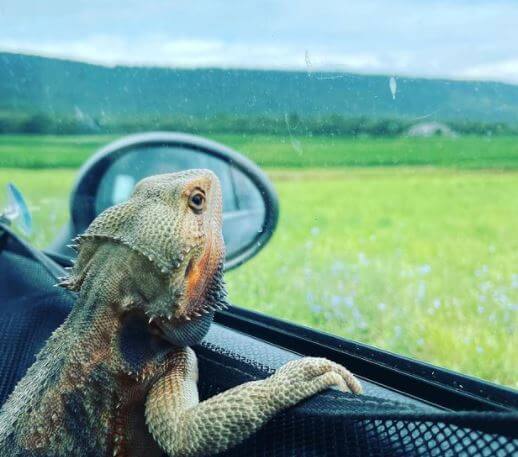
How much UVB does a bearded dragon need?
The amount of UVB we should give to bearded dragons falls in between 8 hours to 12 hours per day.
But first, let’s answer the question of why we have to give this radiation to these reptile animals in captivity.
Why Bearded Dragons Need UVB?
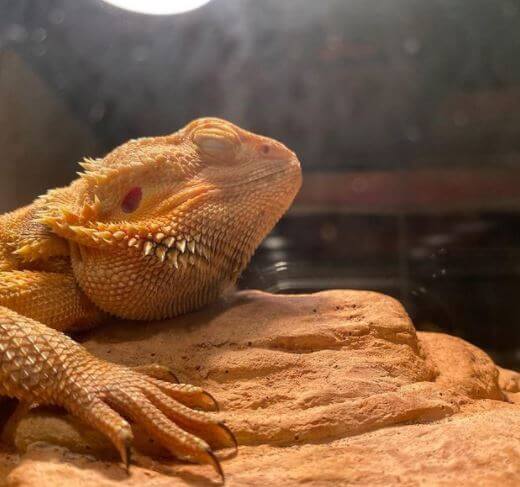
Bearded dragons come from Australian dry areas like deserts or subtropical woodlands.
They like to live in a warm environment. As cold-blooded animals, they use heat from sunbeams to increase their body temperature.
There are 3 bands in sunlight: infrared radiation, visible light, and ultraviolet radiation. And they are all necessary for beardies’ biological functions, especially UVA and UVB.
UVA affects their health and other daily activities such as feeding, breeding, or basking.
On the other side, UVB assists them to implement the vitamin D3 synthesis process and metabolize calcium. Calcium supports bone and muscle improvement.
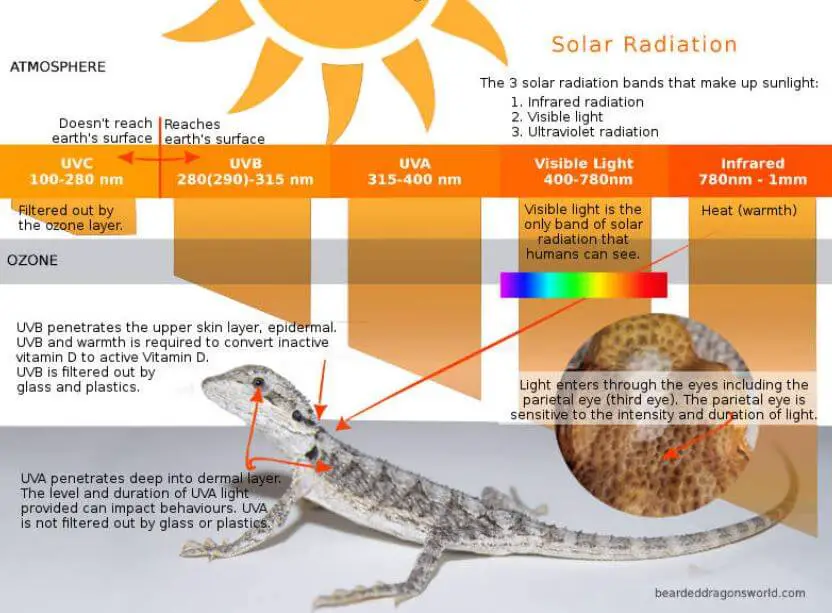
Lack of UVB can cause several problems in bearded dragons such as metabolic bone disease.
It affects a lot on beardies’ daily activities. The metabolic bone disease results in serious muscle, bone, and tissue damage.
When their bone and tissue are too soft, walking even seems so hard to do.
Some symptoms of calcium defects you can easily observe are soft jaw and facial bones, fractured and broken bones, difficulty in moving, and swollen limbs and jaw.
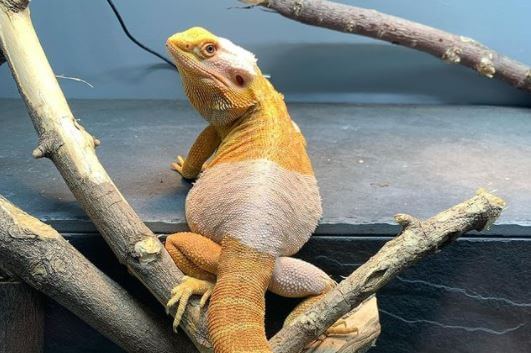
In captivity, we need to provide enough UVB to avoid calcium deficiency.
UVA can be transmitted by any light bulb, but UVB needs a special one to do so.
The question is, what level is suitable for bearded dragons in a day?
How Much UVB Does a Bearded Dragon Need?
You should choose a bulb that gives out 8-10% UVB light. The amount of time you may turn it on depends on the weather.
In warmer seasons, you can leave the light on for 10 to 12 hours.
In colder months, bearded dragons need light for only 8 to 10 hours.
The adjustment should be done throughout the year based on the weather.
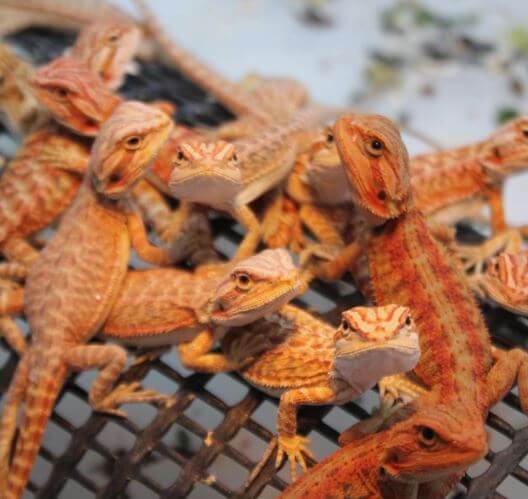
In addition, beardies also need UVB to consume their meals.
Make sure that you give them an hour of light before breakfast and after dinner to stimulate food digestion. Avoid feeding them in the dark.
People also wonder how much light bulb wattage is suitable for their beardies.
This number depends on the material of the tanks and other factors: distance from UVB lamps to your beardies and whether there are any obstacles between your pets and the light source.
Materials of the enclosure may affect your decision in choosing bulb wattage.
For example, wooden tanks may not need a high light bulb watt compared to glass ones.
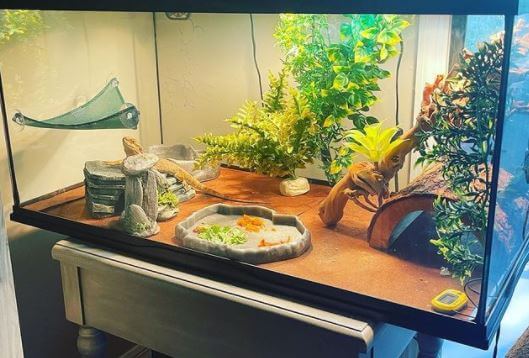
The way you place your UVB source also plays an important role.
Light bulbs should stretch 2/3 to 3/4 the length of your beardies’ tank.
UVB does not go through glass or plastic.
There should not be any barrier between UVB lamps and beardies.
An additional note is that you should stay away from coil bulbs.
These types of radiation light produce a very high output.
This may be too much for your beardies to handle and it can be inconsistent, which can cause illness related to their vision and other diseases.
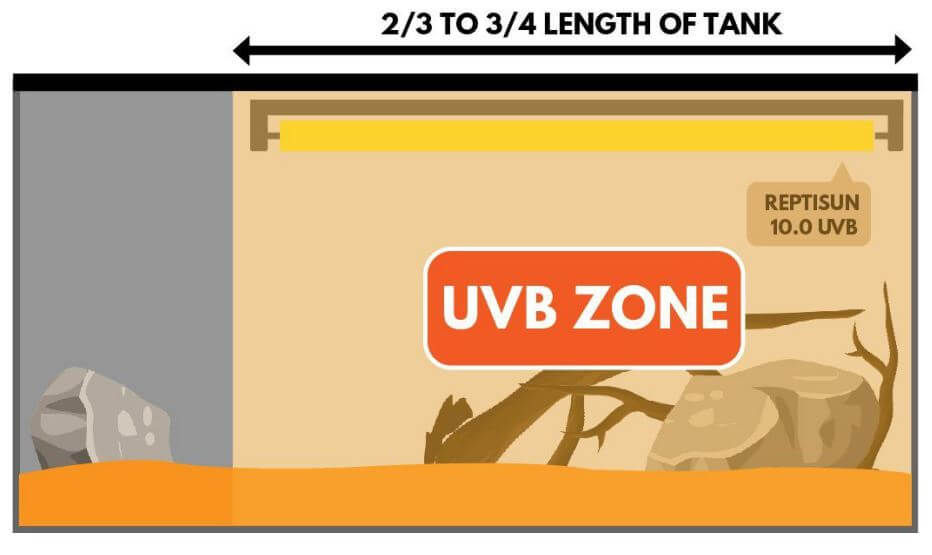
How Much UVB Is Too Much for a Bearded Dragon?
Understanding the amount of UVB we should give out to beardies helps them avoid many illnesses that may be bad for their development.
However, there are circumstances where they get overexposure to this radiation.
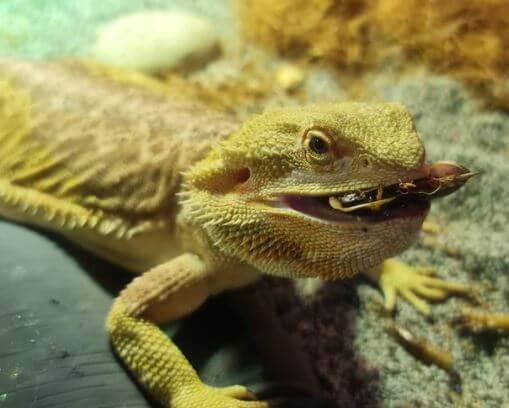
1. Diseases and Symptoms of Overexposure to UVB
Some problems your beardies may suffer are hypercalcemia, photo-kerato-conjunctivitis, or hyperkeratosis.
Hypercalcemia is when the calcium level in bearded dragons’ blood is above average.
This condition may make beardies sick or even fatal.
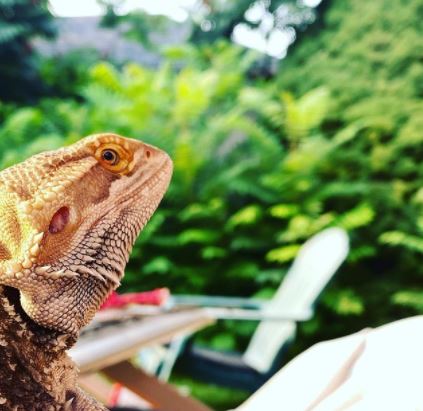
Photo-kerato-conjunctivitis refers to eye problems when overexposure to UVB happens.
This illness damages the transparent cells on the surface of the eye and the lining of the eyelids.
It is similar to “snow blindness” in humans. Luckily, this only affects the surface of their eyes.
Moving UV light away helps your beardies heal this wound by themselves and, in some cases, do not need medication.
Hyperkeratosis indicates the outer skin thickening caused by overexposure.
The illness will result in uncomfortable skin lesions, especially around beardies’ mouths.
This makes them experience difficulty in eating and breathing.
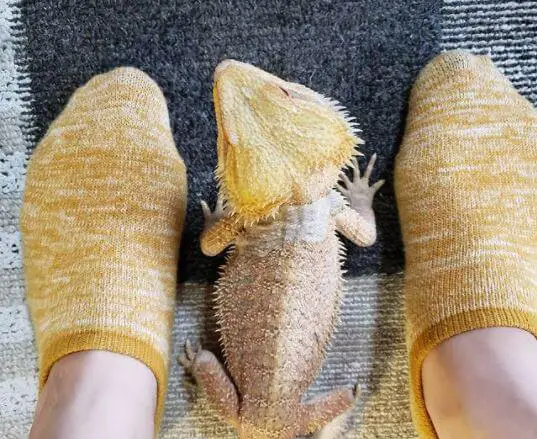
There are some common symptoms you can observe when your beardies are overexposed to UVB.
Swollen or cloudy eyes of beardies are one of those syndromes.
Limited vision makes them hard to move around. This may result in evasive postures of beardies.
Muscle weakness and skin thickening may occur when there is an overexposure condition.
In some most serious situations, beardies can become comatose.
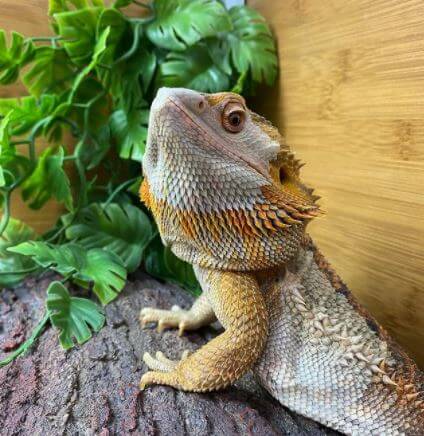
You should bring your beardies to the doctor when these syndromes appear to avoid worse cases.
2. Causes of Overexposure to UVB and How to Prevent It
There are many causes that lead to overexposure to beardies.
Bulbs are too close to their enclosure, the light is on for a longer time (more than 16 hours), poor quality lamps, and there are no hides in the tank.
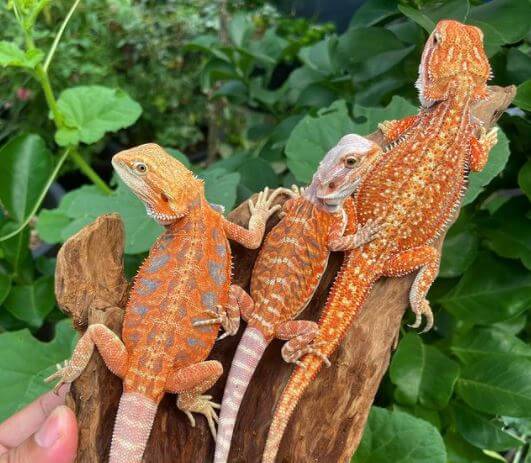
Knowing overexposure causes helps owners find solutions to avoid these.
Firstly, lamp placement plays a crucial role in providing enough UVB light for bearded dragons.
If the UVB is too far away, your pets may face calcium deficiency.
But if the light source is too close, they may get overexposure. So, an ideal distance is about 18 inches.
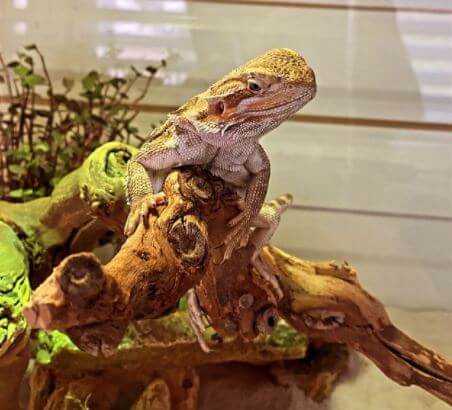
Secondly, enclosure habitats should provide places that serve many purposes of bearded dragons such as basking spots and shade areas.
Some additional lamps you may use are cool side lamps, ceramic heat emitters, and basking lamps.
When they feel like there is too much light, they can use shade areas to escape and adjust their body temperature.
Finally, day and night cycles should be balanced properly to provide a natural environment for bearded dragons to live in.
You can see this reference to set up a perfect living habitat for your beardies:
Frequently Asked Questions About UVB for Bearded Dragons
1. Do Bearded Dragons Need UVB at Night?
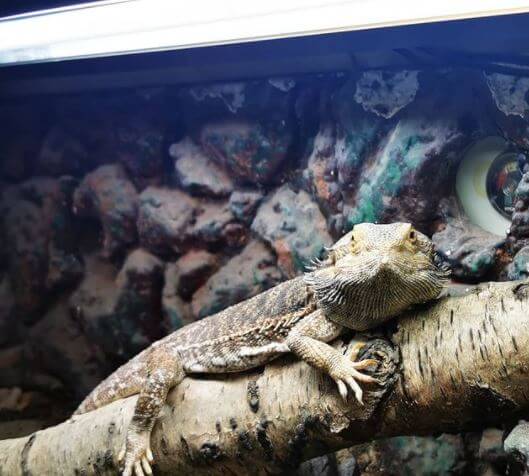
They do not need UVB at night. In nature, the sun rises and sets, and the temperature goes up and down accordingly.
We should simulate this day-night cycle in captivity so that our beardies can live in a more natural-like environment.
2. Are There Any Lights I Should Turn On at Night for Bearded Dragons?
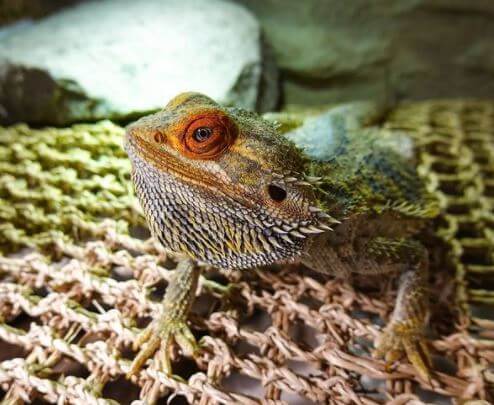
No, you should not leave any lights on at night. They need darkness to rest properly just like in their wild habitat.
Light may intervene in their sleep and make them uncomfortable.
3. How Often Should I Change My Bearded Dragon UVB Light?
As bulbs age, the output drops down to the 280-315 nm range. Using too long may make them less effective than before.
So, you have to check and replace these bulbs at an appropriate time. After 6 months of use, you should replace them with new ones.
4. Do I Have to Use Other Heat Bulbs or Lamps?
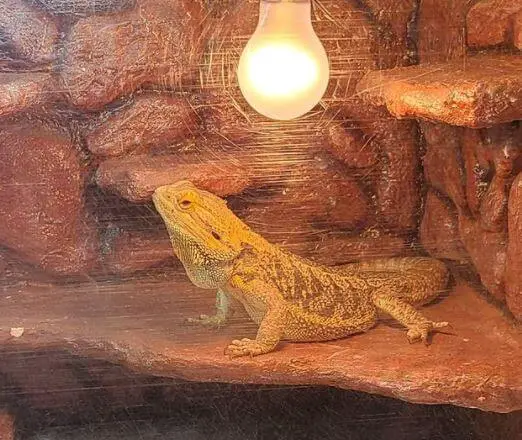
For beardies’ basking purposes, or to create shade areas for them, heat bulbs and cool shading lamps should be used since most UVB light bulbs do not serve other purposes of bearded dragons.
You can also use additional night heat to provide a suitable temperature for them.
5. How Long Can Bearded Dragons Go Without UVB?
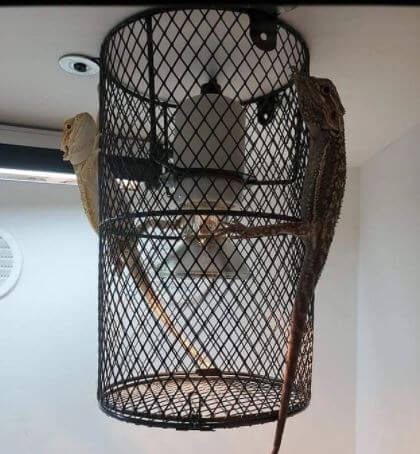
You should not let your beardies go without UVB for more than two days.
The longer time they do not receive the radiation, the more biological damages they will get.
However, daily UVB providing should be maintained to ensure beardies’ health.
6. Do Bearded Dragons Need 5.0 or 10.0 UVB?
Bearded dragons can use both 5.0 and 10.0 UVB bulbs, depending on their basking spot distance.
Use 5.0 for closer distances (6-8 inches) and 10.0 for farther distances (10-12 inches) from the bulb.
Conclusion
Through this article, we know that UVB light is a critical component for bearded to survive. An enclosure in captivity can not miss out on UVB sources.
How much UVB does a bearded dragon need depends on the weather and seasons.
The average time light bulbs should be on is 10 hours per day. Too little or too much UVB can cause many diseases in beardies and influence their health.
So, it is important that you should pay attention to the level and the way you set up your UVB light bulbs.
Key points for which UVB is needed for bearded dragons:
UVB (Ultraviolet-B) light is crucial for the health and well-being of bearded dragons. They require UVB light to synthesize vitamin D3, which helps them absorb and metabolize calcium, a vital mineral for bone health and overall functioning. Here’s a breakdown of how much UVB exposure a bearded dragon needs:
1. The Right Type of UVB Light:
- Choose a quality UVB bulb designed for reptiles. Linear fluorescent or compact fluorescent UVB bulbs are common choices.
2. UVB Strength:
- Bearded dragons require UVB with a specific strength. A UVB bulb with an output of 10-12% (or 100-120 µW/cm² at the basking spot) is typically recommended.
3. Proper Placement:
- Position the UVB bulb inside the enclosure to ensure it covers the basking area where the dragon spends most of its time.
- Ensure the bulb is unobstructed by a mesh or glass barrier that can filter out UVB rays.
4. Duration of Exposure:
- Bearded dragons need around 10-12 hours of UVB exposure each day.
- Simulate a natural day-night cycle to provide consistency in their UVB exposure.
5. Regular Replacement:
- UVB bulbs degrade over time, and their output decreases. Replace the bulb as recommended by the manufacturer, typically every 6-12 months.
6. Distance from Bulb:
- Ensure the dragon can bask within 6-12 inches of the UVB bulb to receive the full spectrum of UVB rays.
7. Adjust for Age and Size:
- Young and growing bearded dragons need more UVB exposure than adults.
- Adjust the UVB bulb’s strength or placement as the dragon grows.
8. Supplement with Calcium:
- Even with proper UVB exposure, it’s essential to provide a calcium supplement to ensure your dragon gets enough of this vital mineral.
9. Monitor Behavior and Health:
- Watch for signs of UVB deficiency, such as lethargy, weakness, or twitching limbs.
- Regularly consult with a reptile veterinarian to ensure your dragon is receiving adequate UVB and calcium.
10. Natural Sunlight: – While natural sunlight is ideal, providing UVB through bulbs is recommended due to the potential risks and difficulties of exposing your dragon to direct sunlight.
11. Switch to MVB Bulbs (Mercury Vapor Bulbs) for Some Species: – Some bearded dragon species, like the Inland Bearded Dragon, may benefit from Mercury Vapor Bulbs, which provide both UVB and heat.
12. Consider Individual Variability: – Some bearded dragons may require slightly different UVB conditions, so observe your pet’s behavior and health to make necessary adjustments.
13. Prevent Overexposure: – While adequate UVB is vital, excessive exposure can also lead to health problems, such as UVB burns or stress. Follow guidelines and observe your dragon’s behavior to find the right balance.
In summary, bearded dragons require appropriate UVB exposure to maintain their health and well-being. Ensure you use the right type of UVB bulb, place it correctly, and provide the recommended strength and duration of exposure. Be attentive to your dragon’s behavior and health, and consult with a reptile veterinarian for guidance on UVB and calcium needs specific to your pet’s age and size. Proper UVB care contributes to the overall vitality and longevity of your bearded dragon.
Further Reading:
- Carolina Custom Cages Terrarium Review
- 8 Best Basking Rocks for Beardie: What Is the Best Choice?
- 10 Best Thermometers for Beardie: How to Choose the Best One?
- 5 Best Beardie Lighting Setupd for Beardie Lovers
- 9 Best Heat Lamps for Beardie: Natural Habitat Provided

